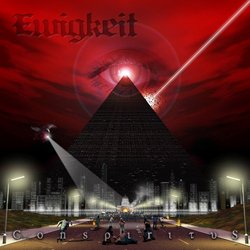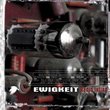| All Artists: Ewigkeit Title: Conspiritus Members Wishing: 0 Total Copies: 0 Label: Earache Records Original Release Date: 1/1/2005 Re-Release Date: 12/13/2005 Genres: Pop, Rock, Metal Style: Number of Discs: 1 SwapaCD Credits: 1 UPC: 745316032627 |
Search - Ewigkeit :: Conspiritus
 | Ewigkeit Conspiritus Genres: Pop, Rock, Metal
|
Larger Image |
CD DetailsSimilar CDs
|
CD ReviewsElectronics, ambiance and progressive combined Murat Batmaz | Istanbul, Turkey | 10/15/2005 (4 out of 5 stars) "Ewigkeit is the German word for "eternity" and an excellent choice for British solo musician James Fogarty's project. Even though Fogarty released a good number of other albums before Conspiritus, I've never heard of this amazing band before. I am more than impressed and feel Ewigkeit is one of the most interesting bands on Earache's roster.
What we have here is a seamless blend of a hybrid of genres, focusing on a futuristic theme with resonatic vocals, ethereal keyboard and synth work, crunch-filled guitar rhythms, and dynamic waves of textures cleverly mixed by John Fryer (Depeche Mode, NIN). The music is infinitely layered with wild dynamics and ambiance from 70's space rock bands to modern day electronic sounds and huge orchestral arrangements. The album is laced with an impressive continuity to it, as each track seamlessly connects to the next one with unifying elements that range from spoken voice-overs, radio transmission excerpts, or simply electronic bleep sounds. Fogarty's concept deals with greed-driven organisations trying to control mankind through brainwashing the masses using the services of the media and other global corporations. It may seem pretentious, and maybe it is, but the album flows perfectly fine, bordering on a multitude of bands, mostly Pink Floyd and some of Roger Waters' earlier solo releases. Check out "Transcend the Senses" which begins with distant gospel like vocals that quickly disappear into white noise, and a heavily Russian-accented voice begins to narrate the futuristic concept over lush yet somewhat languid synth work. Underlying these sounds is a bass and drum rhythm punctuated with a sweeping arrangement. This song proves to be a great breakdown as it pops right in the middle of the record and slams into the explosive rock-guitar number "The Thought Police", one of the most aggressive songs on the album. At some point, I am reminded of Roger Waters' Amused to Death masterpiece with its politically-charged texts, embodiment of chaos with all those sirens echoing in the background, and its Floydian sing-along chorus that begins and ends simultaneously with a majestic synth lead. "How to Conquer the World" cements Fogarty's brilliant songwriting. This is pure chaos; people chant, scream and riot, before a mellow church organ is played (bringing to mind Queenryche's Mindcrime). However, all hell breaks loose as militaristic drums begin to pound and Fogarty sings his lines with great conviction as a thick layer of ambience surrounds the piece amidst textural guitar melodies that echo Pink Floyd's The Wall. The album is far from in-your-face heaviness though. It actually develops very coherently, starting with strummed acoustic guitars, synth washes and various wind effects. There are lots of sampled computer voices or people talking in the background, and almost every song ends with hard-to-decipher spoken segments that seem to come out of a muffled radio. That is just the surface of the iceberg though. Repeat listens suggest diversity; check out the fusion dissonance underneath modern electronic soundscapes on "Square Sunrise" or the efficient minor chord progressions happening on "Far Away from Heaven", a song that has a great contrast of Fogarty's vocals that move from his chant-like harmonies to soft and fragile whispered lyrics while looped synths continue to saturate the entire composition. It's simply beautiful. The album also dives headlong into world music on the last two tracks. Ethnic percussion is mixed with electro-folk (yes it's electronic music with Irish folk harmonica) on "Theoreality", whilst African tribal music influences are merged into soothing acoustic guitar-oriented experimentalism on the title track. I wish I was familiar with Ewigkeit's back catalog, so I could compare Conspiritus to Fogarty's earlier works. At any rate though, if you're also new to this band, feel free to start right here. Personally, when listening to this great disc, I had to think of Scott Mosher, Ulver, Hubi Meisel, Signify period Porcupine Tree, the first Devin Townsend album, Echo Us, along with the already mentioned Pink Floyd and Roger Waters. No, Ewigkeit isn't a clone of any of those bands. But it is equally mesmerizing. Very highly recommended." |

 Track Listings (10) - Disc #1
Track Listings (10) - Disc #1